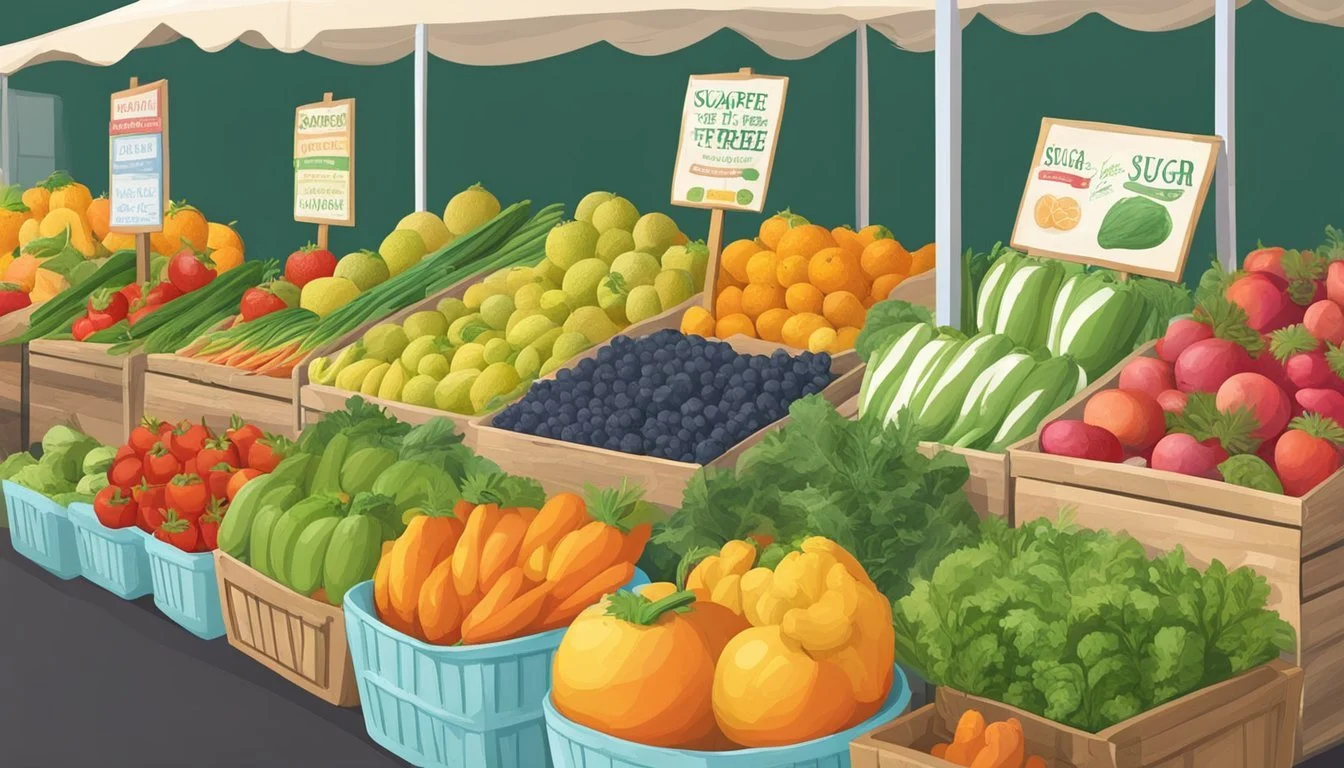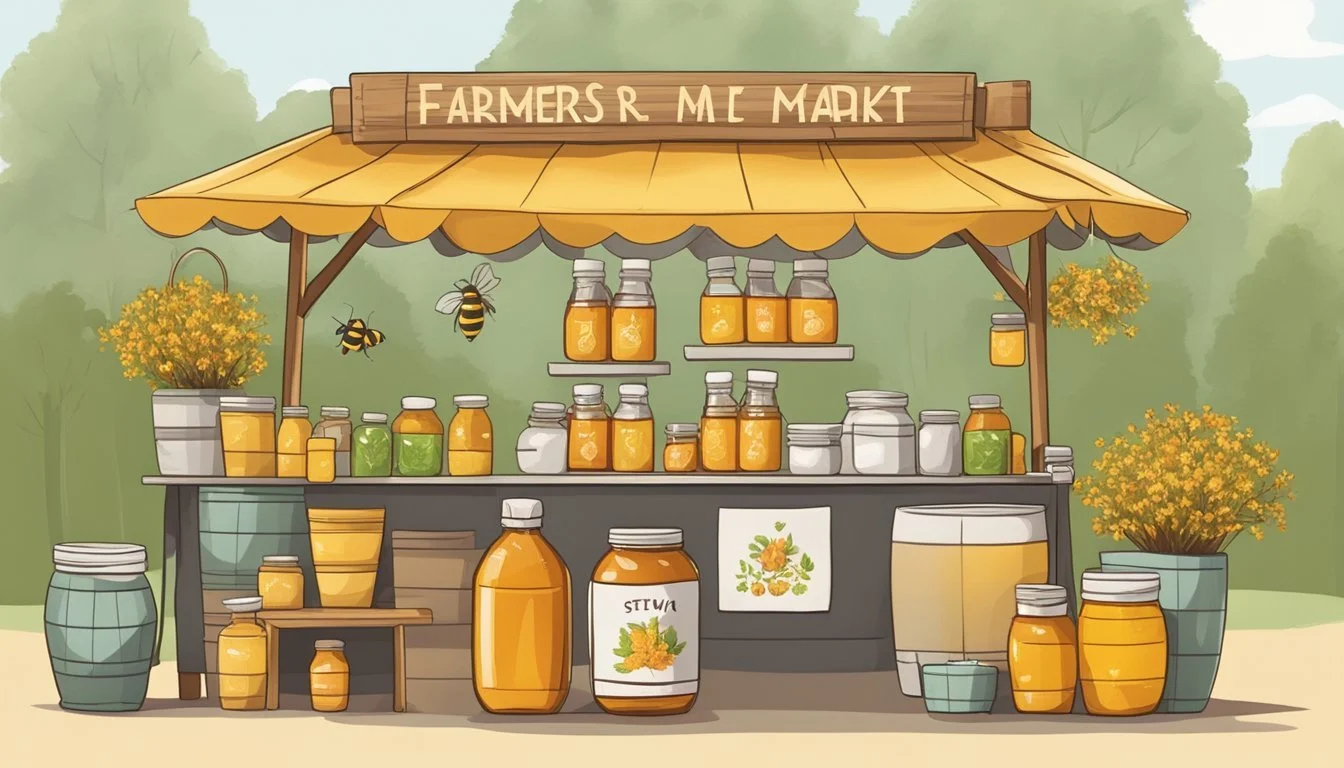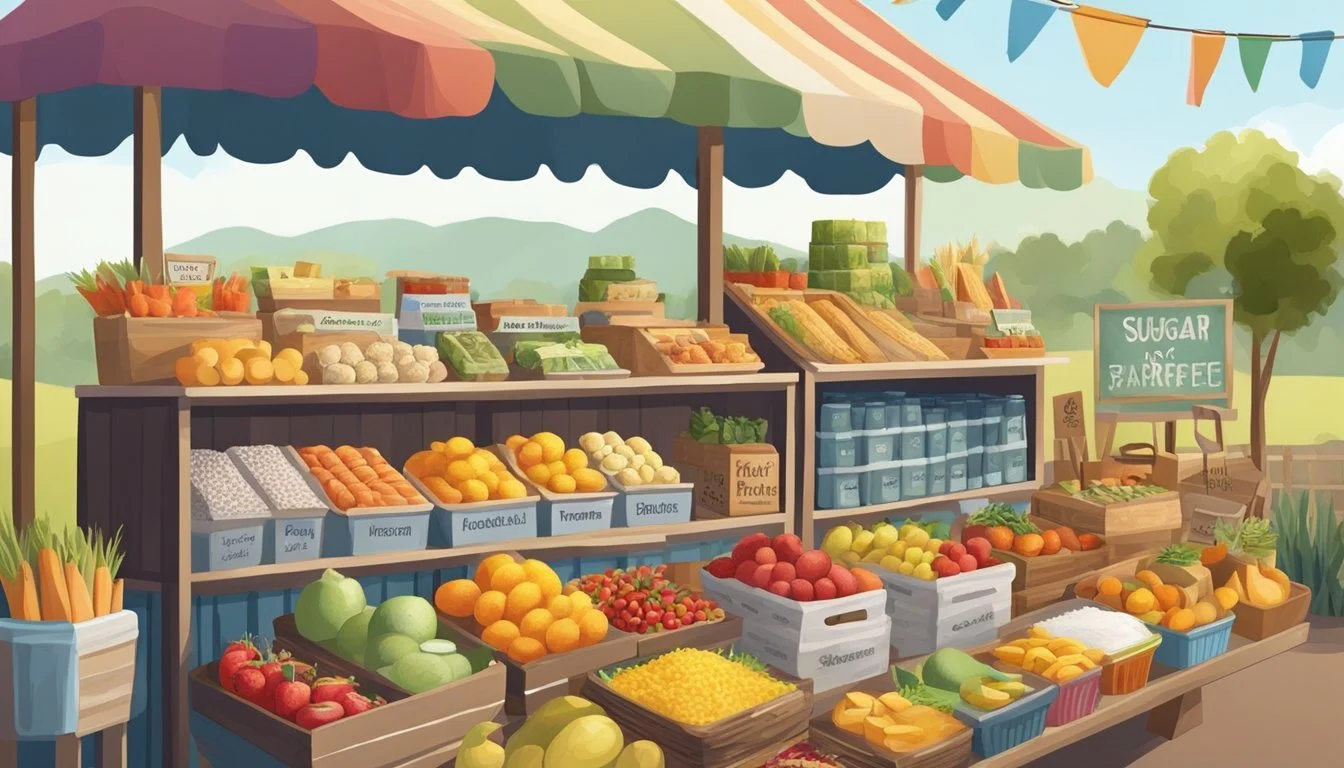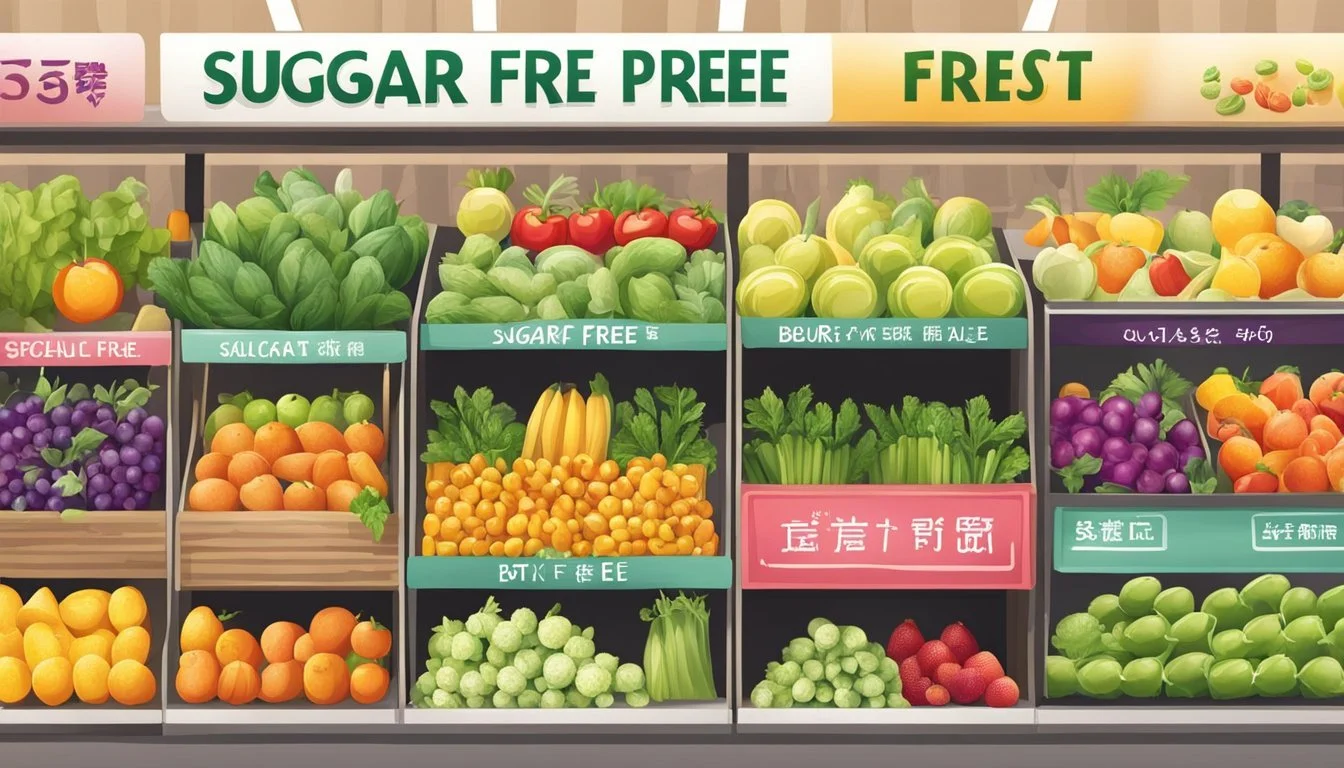A Guide to Sugar-Free Options at the Farmers' Market
Health-Conscious Picks
Farmers' markets are increasingly catering to health-conscious consumers who are vigilant about what they eat. In response to a growing demand for healthier food options, many vendors are offering sugar-free choices that appeal to those looking to reduce their sugar intake for various health reasons. From fresh produce naturally low in sugar to artisanal products and prepared foods consciously made without added sweeteners, these markets provide a plethora of options for maintaining a balanced diet without sacrificing flavor or variety.
Navigating the abundance of products at a farmers' market can be overwhelming, especially for those new to sugar-free living. The key is to identify foods that are free from added sugars while also being mindful of the nutritional content of natural sugars found in fruits and other whole foods. Educated vendors at farmers' markets are often willing to share information about their offerings, which makes it easier for shoppers to make informed choices. Whole foods like vegetables, nuts, seeds, and quality proteins are staples for those seeking sugar-free options without added preservatives often found in processed foods.
Supporting local agriculture through farmers' markets also encourages the availability of fresh, minimally processed food, making it simpler for consumers to partake in a healthful lifestyle. In addition to fresh produce, alternatives such as bean-based pastas and high-fiber grains are often available, providing substantive, nutritious fare that aligns with sugar-free dietary preferences. Farmers' markets serve as a bridge connecting health-focused individuals with nutrient-dense foods, promoting overall well-being within communities.
Understanding Sugar and Its Effects on Health
Sugar is a staple in many diets, but its excessive consumption is a growing health concern. This section examines sugar's dietary role, the health risks of overconsumption, and how to recognize added sugars.
The Role of Sugar in Our Diet
Sugars are carbohydrates found naturally in many foods and are added to others for flavor, preservation, and texture. The body uses sugar as a source of energy; however, not all sugars contribute equally to nutrition. Naturally occurring sugars, such as those in fruit and milk, often come with essential nutrients. Added sugars, which are introduced to foods or beverages during processing, do not provide significant nutritional value.
Health Risks Associated with Excessive Sugar Consumption
The overconsumption of added sugars is linked to several health issues:
Obesity: Excessive sugar intake can lead to weight gain and obesity due to its high calorie content.
Type 2 Diabetes: High sugar consumption can increase blood sugar levels, contributing to insulin resistance, a precursor to type 2 diabetes.
Heart Disease: According to the American Heart Association, a high-sugar diet can increase the risk of heart attack and stroke.
Fatty Liver Disease: Too much sugar can lead to fat build-up in the liver, causing non-alcoholic fatty liver disease.
Such diets are also associated with chronic inflammation, which is a factor in many of these conditions.
How To Identify Added Sugars on Labels
To reduce sugar intake, it's essential to identify added sugars on food labels. Here’s a quick reference guide:
Ingredients List: Added sugars can appear under various names like sucrose, glucose, high-fructose corn syrup, and molasses.
Nutrition Facts Label: The U.S. FDA now requires added sugars to be listed separately on the label, expressed in grams and as a percentage of Daily Value.
By recognizing these names and checking the labels, consumers can make better-informed decisions and limit their added sugar intake.
Benefits of Choosing Sugar-Free Products
Opting for sugar-free products at the farmer's market can play a significant role in managing health goals. They offer several health advantages, particularly in the areas of weight management, cardiovascular health, and oral hygiene.
Weight Loss and Blood
Navigating the Farmers' Market for Sugar-Free Options
When searching for sugar-free alternatives, it’s crucial to understand the distinction between processed foods and those that are naturally low in sugar. The farmers' market provides an abundance of whole food options, allowing individuals to purchase food items that align with a sugar-conscious lifestyle.
Identifying Naturally Sugar-Free Foods
Fruits and Vegetables: The perimeter of a farmers' market typically features stalls abundant with fruits and veggies. While fruits contain natural sugars, opting for those with lower sugar content like berries, peaches, and melons can be beneficial. Focus on non-starchy vegetables such as lettuce, spinach, and peppers that are inherently sugar-free.
Low-Sugar Fruits:
Berries (strawberries, raspberries)
Peaches
Melons (watermelon, cantaloupe)
Non-Starchy Vegetables:
Leafy Greens (lettuce, spinach)
Bell Peppers
Tomatoes
Conversing with Farmers and Vendors for Insights
Engaging with farmers and vendors can yield valuable insights into the sugar content of their offerings. Inquire about the farming practices they use and whether their produce is organic. This can also lead to discovering sugar-free or reduced-sugar versions of typically high-sugar products, such as jams or baked goods.
Questions to Ask:
"Is this produce grown using organic methods?"
"Do you offer any sugar-free alternatives to these products?"
"Can you recommend the best options for a low-sugar diet?"
Exploring Organic and Whole Food Alternatives
Organic and whole food options at a farmers’ market are ideal for those looking to minimize processed sugar intake. Markets often provide an array of whole grains, nuts, and seeds – all of which are substantial sugar-free options. For beverages, seek out stalls that sell drinks not sweetened with added sugars.
Whole Food Options:
Grains: Quinoa, barley, oats
Nuts: Almonds, walnuts, cashews
Seeds: Chia, flax, pumpkin
Visit markets regularly and utilize the expertise of registered dietitians often present at larger markets to learn more about sugar-free diets and healthy whole food choices. Remember to check for certifications and ask for recommendations on where to buy the healthiest options to support a sugar-conscious lifestyle.
Popular Natural Sweeteners and Their Benefits
Exploring the variety of natural sweeteners can unveil healthier sugar alternatives suited for different dietary preferences and needs. This section discusses various natural sweeteners found at farmers' markets and their associated health benefits.
Understanding Different Natural Sweeteners
Honey: A natural sweetener produced by bees, honey is known for its distinct flavor and potential health benefits that stem from its antioxidant properties. Raw honey, which is unprocessed, may contain more active enzymes and antioxidants.
Stevia: Extracted from the leaves of the stevia plant, this zero-calorie sweetener is significantly sweeter than sugar and does not raise blood glucose levels, making it a safe option for diabetics.
Maple Syrup: Derived from the sap of maple trees, maple syrup is a source of antioxidants and contains minerals such as manganese and zinc. It is often considered as a more natural alternative to highly processed sweeteners.
Monk Fruit: A sweetener made from the extract of the monk fruit has gained popularity due to its zero-calorie content and potent sweetness, which comes without the addition of sucrose, making it a suitable option for weight management.
Agave Nectar: Agave nectar comes from the agave plant and is sweeter than sugar with a lower glycemic index, which means it results in a less dramatic spike in blood sugar levels.
Sugar Alcohols: Sugar alcohols like xylitol, mannitol, and sorbitol occur naturally in plants and provide a sweet taste with fewer calories than sugar, potentially benefiting those who are calorie-conscious.
Fruit Juices: Natural sweeteners can also come in the form of concentrated fruit juices, providing sweetness along with various nutrients and antioxidants naturally found in fruits.
Health Advantages of Common Sugar Alternatives
Natural sweeteners offer a variety of health benefits that can make them appealing alternatives to regular sugar:
Lower Glycemic Impact: Natural sweeteners like agave nectar and sugar alcohols have a lower glycemic index compared to white sugar, potentially resulting in a more moderate impact on blood sugar levels.
Nutritional Content: Unlike refined sugars, some natural sweeteners such as honey and maple syrup contain trace amounts of vitamins and minerals, contributing to their nutritional profile.
Caloric Reduction: Zero-calorie sweeteners such as stevia and monk fruit allow for sweet taste without the added calories, which can be helpful in managing weight and reducing caloric intake.
Dental Health: Sugar alcohols like xylitol are non-cariogenic, meaning they do not contribute to tooth decay and may even have protective effects for teeth, offering an additional benefit over traditional sugar.
Homemade Sugar-Free Foods and Recipes
Navigating the farmers' market for sugar-free options is increasingly popular among those looking to reduce their sugar intake. The following suggestions will guide you through making your own sugar-free snacks, beverages, and preserves that are both tasty and more nutritious.
Preparing Sugar-Free Snacks and Sweets
For those looking to indulge in sweets without the added sugar, there are numerous homemade recipes to satisfy cravings. Sugar-free cookies can be crafted using alternative sweeteners like stevia or erythritol. Cereals can be homemade from a base of oats, nuts, and seeds, baked until crispy without adding any sugar. Here's a basic recipe framework for sugar-free cookies:
Ingredients: 1 cup almond flour, 1/2 cup erythritol, 1 egg, 1 tsp vanilla extract, 1/2 cup unsalted butter.
Instructions: Mix all ingredients, form into cookies, and bake at 350°F for 12-15 minutes.
Sugar-free snacks, such as roasted chickpeas or kale chips, are also easy to prepare and provide a crunchy satisfaction without the sugar spike.
Crafting Sugar-Free Beverages and Smoothies
Creating refreshing beverages and smoothies without sugar is simpler than one might think. Utilize the natural sweetness of ripe fruits like berries, peaches, or bananas. Beverages can be infused with herbs such as mint or slices of cucumber for a refreshing twist without added sugars. A staple smoothie recipe might include:
Ingredients: 1/2 cup unsweetened almond milk, 1/2 cup Greek yogurt, 1 cup frozen mixed berries, 1 tbsp chia seeds.
Instructions: Blend all ingredients until smooth.
These beverages can easily replace sugary drinks and offer a healthier and hydrating alternative.
Creating Sugar-Free Jams and Preserves
Jams and preserves typically contain high levels of sugar, but homemade versions can be made sugar-free by using the natural pectin found in fruits. For example, sugar-free berry jam can be made by slow-cooking berries and allowing their natural sugars to sweeten the jam. One could simply mash the berries, add lemon juice to taste and let the mixture simmer until it reaches the desired consistency. This preserves the fruit's natural flavors and goodness, while omitting unnecessary sugar.
Sugar Substitutes for Special Diets
Navigating the farmers' market for sugar substitutes that cater to special diets can ensure dietary compliance while providing sweetening options. Here's a look at alternatives suitable for keto and low-carb, gluten-free and dairy-free, as well as vegan diets.
Keto and Low-Carb Alternatives
For individuals adhering to a keto or low-carb diet, the primary goal is to minimize carbohydrate intake. Traditional sugars are high in carbohydrates and can disrupt the state of ketosis. Therefore, market-goers may find stevia and erythritol highly suitable, as they contain minimal to no net carbohydrates and have a negligible impact on blood glucose levels.
Stevia: A natural plant-based sweetener with zero calories and zero carbohydrates.
Erythritol: A sugar alcohol that has 5% of the calories of sugar but is practically carb-free.
Gluten-Free and Dairy-Free Sweetening Options
Those with gluten sensitivity or celiac disease will be looking for gluten-free options, while others may seek dairy-free choices due to lactose intolerance or other reasons. They can safely choose stevia, which has no connection to gluten or dairy, and is considered appropriate for individuals with such dietary restrictions.
In addition, xylitol can often be a suitable choice, though individuals should check if it's sourced from gluten-free facilities:
Xylitol: Like erythritol, it's a sugar alcohol and is typically gluten-free, but it's imperative to confirm the source due to cross-contamination risks.
Vegan Sugar Replacements
For those on a vegan diet, ensuring that sugar alternatives do not come from animal sources or involve animal products in their processing is a must. Stevia and erythritol are both vegan-friendly and widely accepted as natural substitutes for sugar.
Consumers may also find monk fruit sweeteners, which are derived from a fruit and have no animal byproducts, serving as an excellent vegan alternative:
Monk Fruit Sweetener: A zero-calorie sweetener that is suitable for vegans and is significantly sweeter than sugar, hence used in smaller quantities.
Understanding the Role of Nutrition and Wholesome Eating
Navigating a farmers' market for sugar-free options can be a nutritious endeavor, given the focus on fiber, proteins, healthy fats, and an array of vitamins and minerals. This section explores the key components of a well-rounded, sugar-free diet.
The Importance of Fiber and Whole Grains
Whole grains are a vital source of fiber, which is essential for digestive health and maintaining steady blood sugar levels — a crucial aspect of a sugar-free diet. Foods rich in fiber, like oats, barley, and quinoa, also contribute to feelings of fullness, which can help curb cravings and overeating.
Fiber sources at the farmers' market:
Oats
Barley
Quinoa
Fresh fruits
Leafy greens
Incorporating Proteins and Healthy Fats
Proteins play a critical role in repairing tissues and maintaining muscle mass. When sugar is off the menu, proteins alongside healthy fats found in nuts, seeds, and avocados, can provide sustained energy. These fats are not only flavorful but also support cardiovascular health.
Protein and healthy fat sources:
Nuts (almonds, walnuts)
Seeds (flaxseeds, chia seeds)
Legumes (beans, lentils)
Avocados
Lean meats (chicken, fish)
Vitamins and Minerals in a Sugar-Free Diet
A sugar-free diet doesn't mean a sacrifice in essential nutrients; it's quite the opposite. Vitamins A and C, as well as the minerals calcium and potassium, can be easily acquired through a diverse intake of vegetables and fruits. Ensure adequate levels of magnesium and manganese by consuming green vegetables, nuts, and whole grains.
Key vitamins and minerals from the market:
Calcium: Leafy greens, almonds
Potassium: Bananas, sweet potatoes
Vitamin C: Citrus fruits, bell peppers
Magnesium: Spinach, pumpkin seeds
Manganese: Whole grains, legumes
Embracing the abundance of wholesome eating at the farmers’ market, individuals can build a nutrient-dense, sugar-free diet.
Potential Risks and Considerations of Sugar Substitutes
When exploring sugar-free options at the farmer's market, it's important to be aware of the potential health risks and considerations associated with sugar substitutes.
Adverse Effects of Some Artificial Sweeteners
Artificial sweeteners, such as aspartame, saccharin, and sucralose, are common sugar substitutes that can be found in various food products. These sweeteners have been investigated for their long-term health effects. Studies have suggested that there could be a link between heavy, long-term consumption of artificial sweeteners and an increased risk of health issues like stroke and heart disease. However, these findings are not conclusive, and other lifestyle factors could play a role.
Weight gain: Despite having fewer calories than sugar, artificial sweeteners can sometimes contribute to weight gain, as they can potentially trigger cravings and overeating.
Gastrointestinal discomfort: Some individuals report bloating and diarrhea after consuming products with artificial sweeteners. This varies from person to person and may depend on the quantity consumed.
Learning About Sugar Alcohols and Their Impact
Sugar alcohols, such as erythritol, are another category of sugar substitutes. Found naturally in some fruits and used as sweeteners in food products, they tend to have fewer calories than sugar but can also cause digestive issues.
Digestive problems: A common side effect of sugar alcohols is gastrointestinal distress. They can lead to symptoms like bloating and diarrhea when consumed in large amounts since they are not fully absorbed by the body.
Caloric content: While sugar alcohols contain fewer calories than regular sugar, they are not calorie-free. It's important for consumers to be mindful of this when considering weight management.
Shoppers at the farmer's market should review product labels and consider these potential risks when choosing sugar substitutes.









